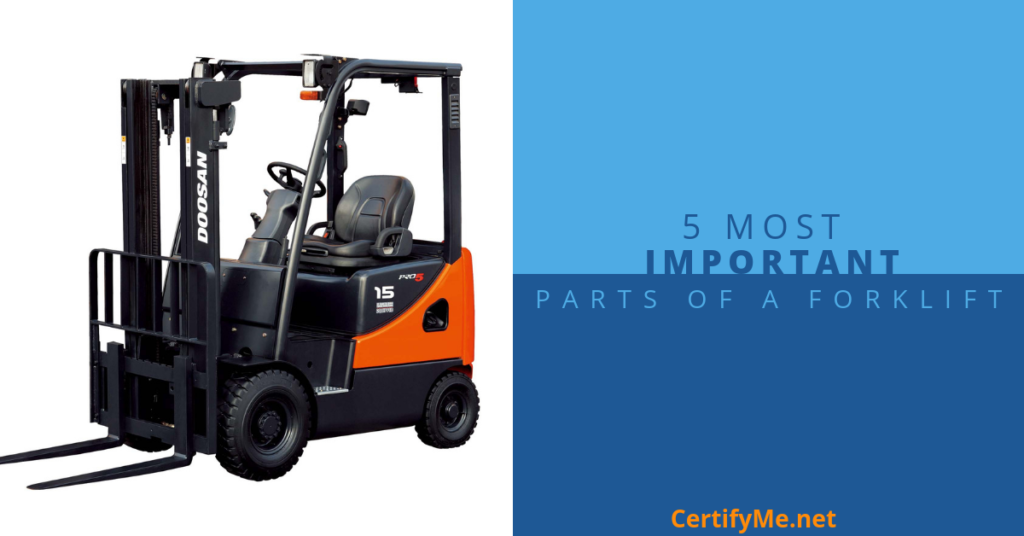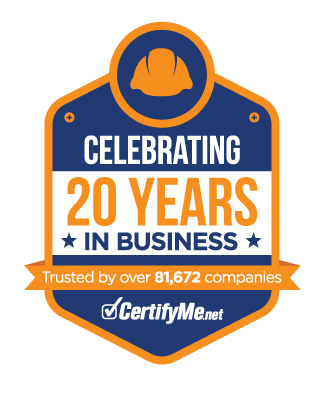Important Forklift Parts: What Operators Must Inspect for Safety
Posted by: admin on April 23, 2025

Forklifts depend on their parts working together perfectly to ensure safe, efficient operation. Worn or damaged forklift components create hidden risks that can lead to costly accidents and OSHA violations. Learning the critical parts to monitor is essential for any operator. Proper training on forklift components prepares workers to spot hazards early and prevent breakdowns.
Forklift Tires: The First Line of Stability
Types of Forklift Tires
- Pneumatic Tires: Designed for rugged outdoor environments, offering excellent shock absorption.
- Polyurethane Tires: Suited for indoor facilities, these provide lower rolling resistance and long life.
- Solid Rubber Tires: Great for mixed indoor/outdoor use, these tires resist punctures and heavy wear.
How to Inspect Forklift Tires
Operators must check for cracking, chunking, bald spots, or unusual wear patterns. Tires worn past the designated safety line should be replaced immediately to maintain forklift stability and safety.
Forklift Warning Indicators and Safety Controls
Common Warning Systems
Modern forklifts feature horns, lights, backup alarms, and dashboard warning systems. Each of these plays a key role in accident prevention.
Importance of Daily Checks
Daily pre-shift inspections help identify malfunctioning alarms or lights before a minor issue becomes a major hazard.
Forklift Forks: Handling Loads Safely
Signs of Fork Damage
Operators should watch for cracked welds, bent forks, chipped edges, and excessive wear. Damaged forks compromise load stability and increase the risk of tipping.
Proper Forklift Forks Inspection
Frequent inspections ensure that the forks maintain their rated capacity and integrity, preventing dropped loads and injuries.
Forklift Cockpit Controls: The Operator’s Dashboard
Key Controls to Monitor
Operators rely on steering wheels, mast controls, brake pedals, and backup alarms every shift. Routine inspections help maintain precise control and quick response times, essential for avoiding accidents.
The Forklift Operator: The Most Critical Component
No forklift part matters more than the operator behind the wheel. Skilled, certified drivers reduce accidents, extend equipment life, and ensure OSHA compliance. Ongoing training helps operators stay sharp and ready to respond to changing worksite conditions.
FAQs About Forklift Parts and Safety
What is the most important part of a forklift?
The forks themselves and the operator controlling them are equally critical for safe, efficient operations.
How often should forklift parts be inspected?
Operators must perform daily pre-shift inspections, while more detailed monthly inspections help catch deeper maintenance issues.
Why do forklift tires wear out quickly?
Heavy loads, rough terrain, frequent use, and poor surface conditions speed up tire degradation.
What happens if a forklift fork cracks during use?
Immediate risks include dropped loads, injuries, damaged inventory, and potential OSHA violations requiring costly repairs or fines.
Boost Forklift Safety with CertifyMe Training
Proper equipment maintenance starts with properly trained operators. CertifyMe offers fast, affordable forklift certification online to help your team stay OSHA compliant. Workers can access courses anytime, pass certification exams at their convenience, and enjoy free three-year renewals. Keep your forklifts — and your workplace — safer with CertifyMe.
Welcome to CertifyMe.net
CertifyMe.net has offered online forklift certification since 1999. With Our Convenient online program. your employess can earn their certification in an hour or less.
Browse Online Certifications:
This low-cost program can be compeleted anytime, anywhere!







